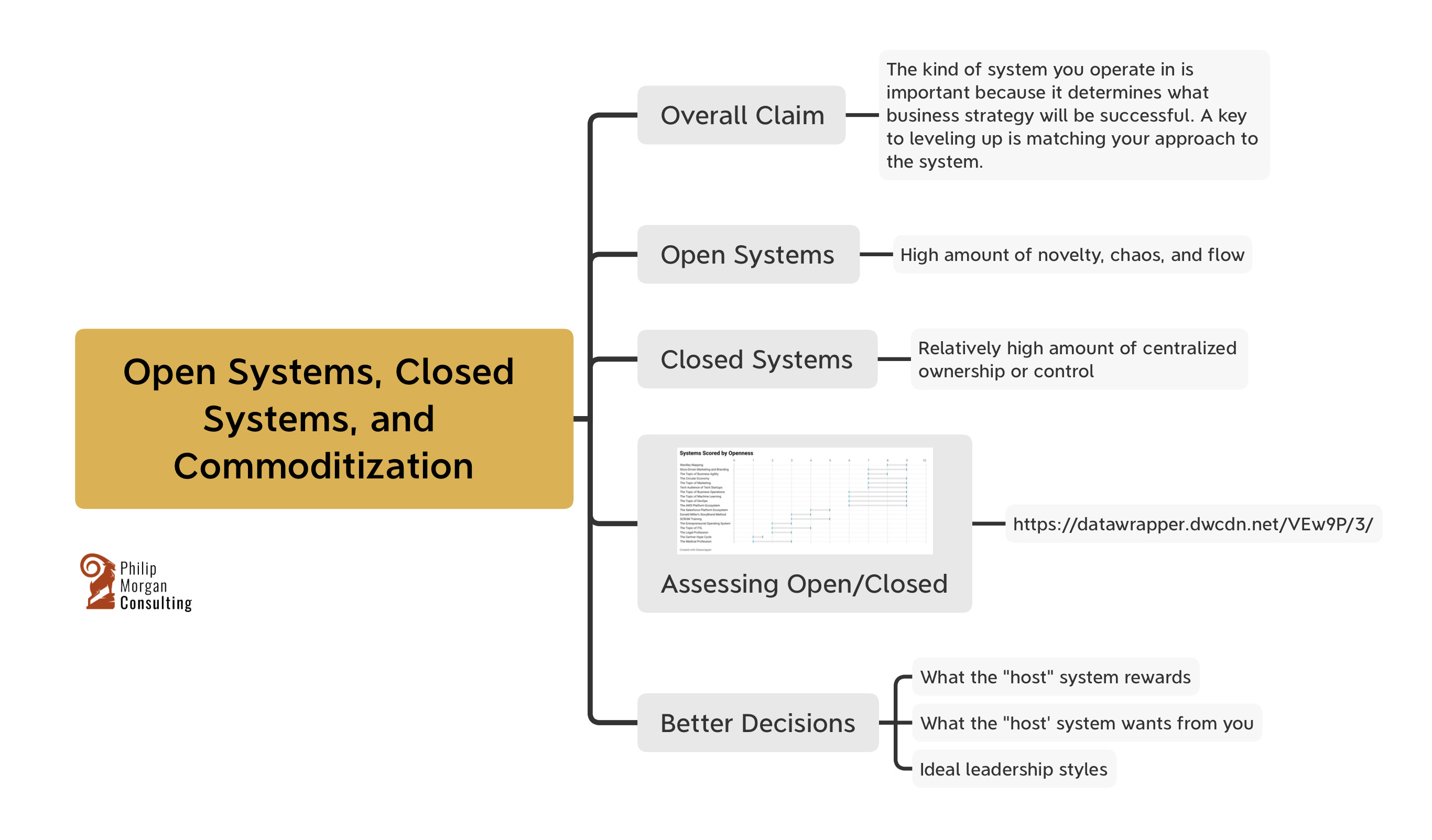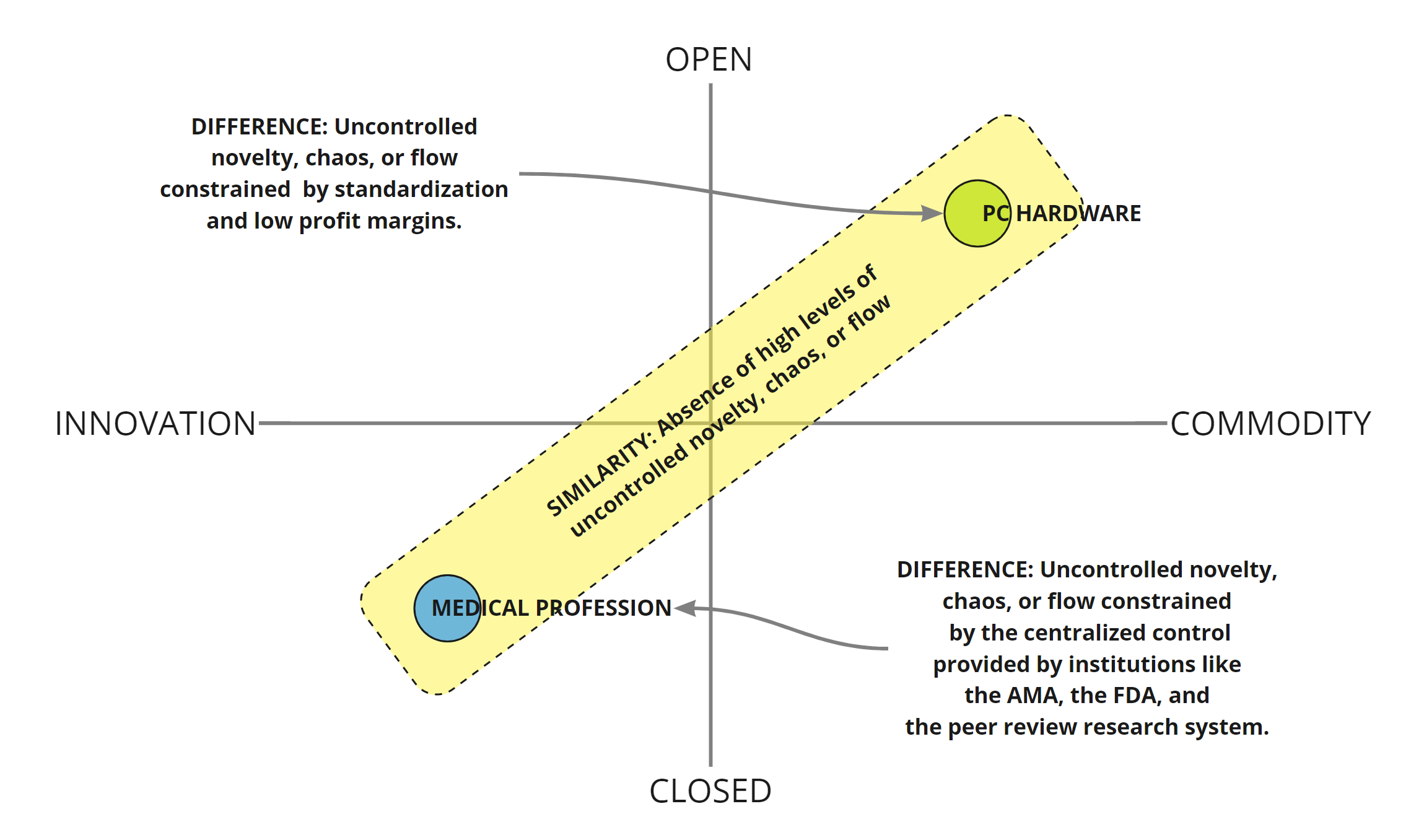I've noticed that some indie consultants can dramatically level up in a few years while others seem stuck. Individual factors (personality, for example) certainly contribute to this, but the kind of system that consultant is operating within is also an important factor. The kind of system you operate in is important because it determines what business strategy will be successful.
Why this matters to you: A key to leveling up is matching your approach to the system.

The system you operate within is bigger than you. It is bigger than you and the client(s) you are currently engaged with. In terms of size, it is closer to "the market" you focus on or, if you're focused on a platform, the system is the platform ecosystem.
No system is 100% isolated from its surroundings. There are closed-ish systems, but there are no 100% completely closed systems that exchange no information or energy with their surroundings. Not in nature, and definitely not in business. This makes it hard to draw clear bright lines around systems. For this article we'll basically think of the system that contains you and your clients as equivalent to the market or platform you're focused on.
Open Systems #
Open systems in business feature a relatively high amount of novelty, chaos, and flow. They feature distributed control or no centralized control, and lots of unmanaged flow into the system. These systems are often too large or complex to be entirely knowable.
This is really about the amount of change within the system, but it's specifically about 3 facets of change:
Novelty: Change as newness
Chaos: Change as unpredictableness
Flow: Volume of change
Closed Systems #
Closed systems in business feature a relatively high amount of centralized ownership or control. This ownership/control attempts to manage change within the system.
Identifying Open/Closed-ness #
In the graph below, I've characterized some systems based on how I perceive their open/closed-ness. I've given each system an "openness score" from 0 to 10, so think of 0 to 5 on this scale as relatively closed and 5 to 10 as relatively open. The scores are represented as ranges because representing them as single numbers would convey artificial precision where no such precision is actually present.
You can measure the pH of a liquid pretty easily and precisely. Here is a $12.99 meter that will do it very well. No such meter exists for measuring the open/closed-ness of a system, but you can certainly characterize a system accurately enough to use this open/closed systems idea to improve your decision making.
Commoditization #
Commoditization is a force of human nature that seeks to modularize and standardize things. Commoditization hates waste and seeks efficiency. Commoditization is why an Apple A13 processor (6 oz or so including phone and battery, <10 watts, $900 or so in 2019 dollars) can outperform the Cray 1 supercomputer (5.5 tons, 195,000 watts, $33 million in 2019 dollars) by a factor of 975 (measured in GFLOPS, ignoring other advantages a supercomputer might have).
Commoditization is the endpoint for innovations that reach sufficient scale or importance, no matter whether the innovation is a hard tech like CPUs or a soft tech like the Toyota quality management system.
A commoditized system and a closed system may have little in common. You can have a commoditized system that lacks centralized ownership/control (making it somewhat open), like Windows PC hardware. And you can have a very closed un-commoditized system, like the medical profession. The similarity these examples do share is they all lack high levels of uncontrolled novelty, chaos, or flow at the system level. In the commoditized+open system, uncontrolled novelty, chaos, or flow are constrained by standardization and low profit margins. In the un-commoditized+closed system, uncontrolled novelty, chaos, or flow are constrained by the centralized control provided by institutions like the AMA, the FDA, and the peer review research system.

Using This Idea to Improve Your Decision Making #
When deciding how to specialize, earn visibility, and earn trust, knowing the kind of system you are working within (or choosing to specialize in) is important because your choices need to work with rather than against the system.
Imagine the system of a small vertical like healthcare architecture and design. One media company creates most of the publications and events in this space. They don't legally own anything other than their own business, but their dominance in the media landscape of this small vertical is a sort of centralized ownership and control (closed system). Now imagine that you barge in and start organizing a national-level virtual conference that competes with their national-level in-person conference without coordinating with them. This "forgiveness, not permission" approach may earn you more enemies than friends in this small, tightly-connected vertical. The more productive approach might have been to earn visibility from the stage of the dominant player's conference rather than create your own, or at least to coordinate with them on the creation of your own.
Likewise, consider the AWS software ecosystem. Despite the presence of a central owner of the AWS platform (Amazon — the A in AWS), there are still large amounts of novelty, chaos, and flow in this platform ecosystem. It is an open-ish system. The same"forgiveness, not permission" approach not only works better in this kind of system, it might be mandatory to really succeed in this kind of system. There's nobody to really ask permission of in the first place, and the mindset of treading carefully and fully mapping the system before you make any moves is a losing mindset in a system that features so much uncertainty and fast-moving change.
Generally, we can say the following about how this idea of open/closed/commoditized systems applies to our decisions:
(If you're on a small screen device, please note this chart has 4 columns you can access by scrolling horizontally.)
| Open | Closed | Commoditized | |
| What the system rewards | You tolerate uncertainty You respond to opportunity by saying "Why not me?!" You have a strong "figure shit out" ability You pioneer and propose tentative best practices, even under conditions of uncertainty or constant change You help clients see clean, simple ways to benefit from the mess of the open system You feel safe when roles and boundaries are more fluid than fixed | You thrive in hierarchies or well-established networks You respond to opportunity by saying "is this in X's wheelhouse?" You love building and refining a machine-like solution/team/service You enjoy improving what is already reasonably good You help clients make sense of new or threatening changes to the established order You feel safe when roles and boundaries are more fixed than fluid | Creativity and innovation mean finding new ways to get projects done faster and cheaper Building a "moat" for your business based on process or value chain efficiencies Being outstanding at discovering and specifying client needs Bundling complementary capabilities into one business Finding ways to generate more revenue per client/customer |
| Ideal leadership styles | Vision Inspiration | Sense-making Guidance | Risk reduction Management |
| What the system wants from expertise | Figuring things out Navigating high levels of change and uncertainty Unlocking new value | Respect for or allegiance to the system Help maturing the system Evangelists for the system | Scalable efficiency and quality Optimization |
| What kind of entrepreneur does the system want you to be? | Good at creating value in highly uncertain, fast-changing situations | Good at converting whitespace and connections into value | Good at creating new value in highly constrained situations |